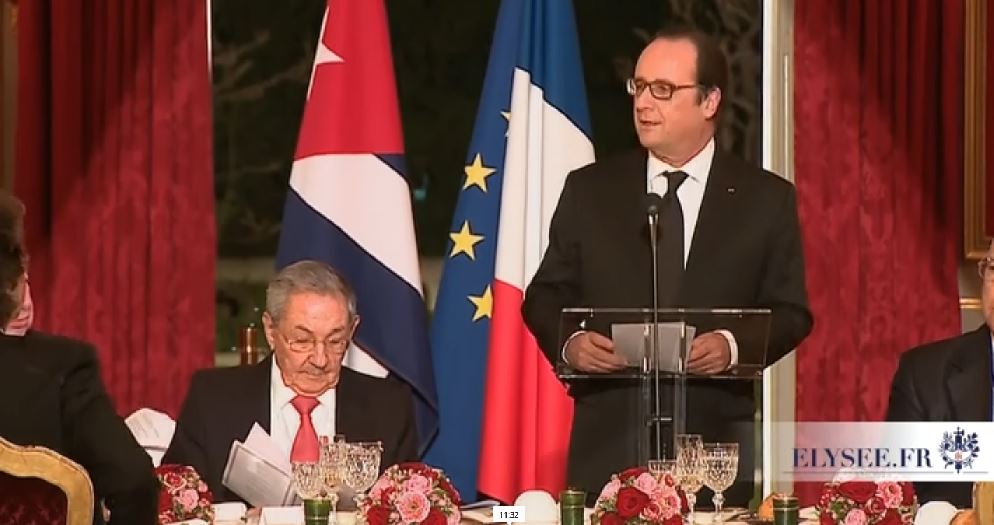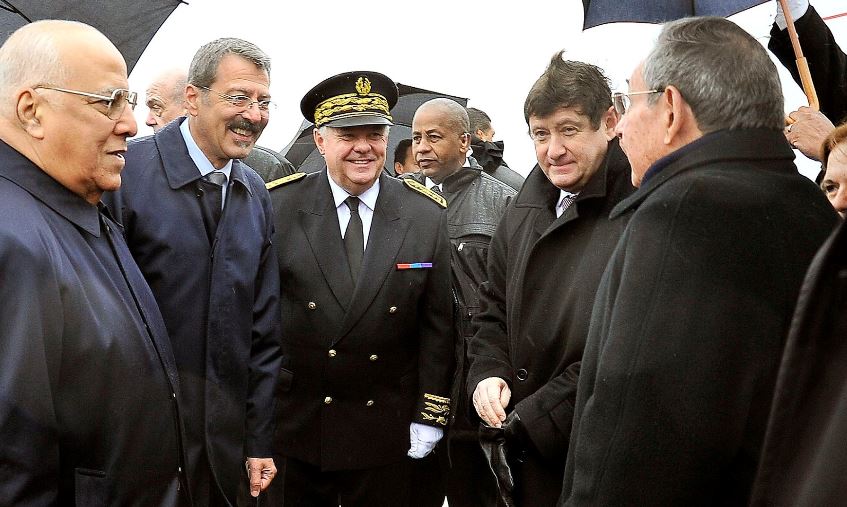
Hollande stresses need to end the ’embargo/blockade’ (Video)
At a state dinner Monday night at the Elysée Palace, President François Hollande began his toast with a new call for the United States to end its economic blockade of Cuba. Alluding to the easing of some restrictions issued last month by the departments of Treasury and Commerce, he said:
“I am pleased by the gesture made last month by President Obama, but the most important part is still to come. It is the lifting of the unilateral embargo that for too long has inflicted unacceptable suffering upon the Cuban people and hinders the exchanges that we could have with that country.
“France was the first nation to denounce to the U.N. this decision to embargo, to blockade and our diplomats bring up every year at the General Assembly the need to lift this decision.
“Likewise, France is willing to bring together the European Union and Cuba to reassess the Common Position, which also does nothing but hinder our exchanges and has lost all meaning.”
TO HEAR PRESIDENT HOLLANDE’S ENTIRE TOAST, IN FRENCH, CLICK HERE.
******
FRANCE PLANS TO INVEST PART OF CUBA’S DEBT BACK INTO CUBA
“Eight months after [President] François Hollande’s trip to Cuba, Raúl Castro arrives in France on a state visit,” reports the French daily Les Echos this weekend. Focusing on the practical side of the visit, rather than the ceremonial aspect, the newspaper published the following report, translated here by Progreso Weekly.
—-
This visit, which should allow to build the bases for a forthcoming economic cooperation, comes at a key moment for Cuba. Because the island’s public debt is estimated at 32 percent of the GNP — of which 80 percent consist of interests on delayed payment — a first stage was completed last December with an accord with the Paris Club.
The second stage will be concluded this Monday [Feb. 1], this time on a bilateral level, when an accord on the original principal and interests of the debt due to France, i.e., 360 million euros, will be signed.
The move should signify the cancellation of part of that amount and the conversion of the remainder into the conversion of financing for French projects in Cuba.
The Agency for French Development (AFD), which will open an office in Havana, will participate in the selection of new portfolios, which could involve sectors such as biotechnologies or the environment.
France will first participate in the modernization of Cuba, which in November 2014 published a list of 246 projects of infrastructure costing more than 15 billion dollars in key sectors such as construction, energy, agro-food and pharmaceuticals. And let’s not forget tourism.
A HISTORIC PRESENCE
French business companies have the advantage of maintaining a historic presence in Cuba. [The industrial group] “Bouygues has built practically all the hotel rooms in Cuba,” says Héctor Igarza, Cuba’s ambassador to France.
The promulgation 18 months ago of the new law on foreign investments should sustain this effort while stimulating economic growth in the next five years. From an estimated 2.1 percent in 2015, the rise of the GNP should reach 5-to-6 percent in the period 2016-2020, estimates Euler Hermes in a study.
[Translator’s Note: Euler Hermes is a major provider of trade-related credit insurance.]

BIG WINNERS
Although made strong by its long relationship with Cuba, France does not arrive alone in this new market. It must face strong competition. Scalded by the fall of the Soviet Union, which left them without resources, the Cuban leaders are at present diversifying their suppliers.
China is already present there, while the United States is intent on catching up for lost time. Unless an unlikely change occurs, the U.S. should emerge the big winners of the lifting of sanctions by achieving a $1 billion surplus in exports a year and $6 billion in 2020, according to an estimate by Euler Hermes.
China should see its annual flow grow to $360 million; Spain, to $200 million; Brazil to $120 million and France to $100 million.


